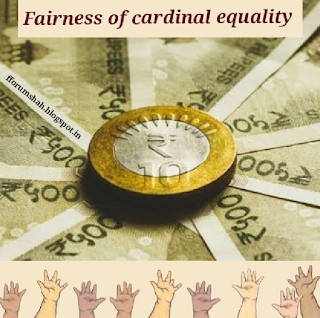Let's talk about a student who studies hard to understand the essence of every subject. Let's consider another student who puts in high efforts towards cheating. Also, let's consider yet another student who behaves like a freerider in both cases. Student 1 secures top rank, Student 2 gets an average, Student 3 fails! Now, if student one is asked to share his score to uplift the ones below him, wouldn't it be an injustice to him? He worked hard to avail the best for himself. Yet, in another case, if he voluntarily shares answers with the ones who didn't prepare for the exams to help them score better, then the ones below him may remain dependent on his hard work. Given this scenario and relating it to the concept of equality in money terms, doesn't it seem that equality approach disincentivises hard workers.
Yet in another scenario, if person B scores the most and then the concept of equality is applied, then it would be fair enough to share a pie with the hard worker. In this case, approach of equality would be suitable but the system would be unsuitable as it allows the cheaters to top!
As always, "given the assumptions" and thinking upon the fairness of cardinal equality that is equality in money terms (say, income equality) how fair would it be to strive towards equality?
If at the end of the game, everyone gets an equal share, there would remain no incentive for hard workers to keep on working hard. The freeriders shall be incentivised to remain the same, eventually hard workers may feel shattered and economy may spiral downwards! Is it the inequality that sustains the economy and motivates people to keep on working hard or incentivises cheaters to keep on cheating? How could a balance be brought into the system? Who works hard and who cheats is never known! If everything gets equalised, wouldn't conspicuous consumption lose its shimmery glitter?
Thus, is the "concept of equality" striving to achieve a goal that would eventually collapse the system?💭
Think on.

No comments :
Post a Comment